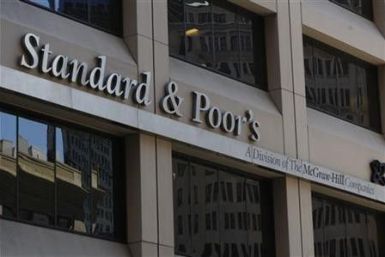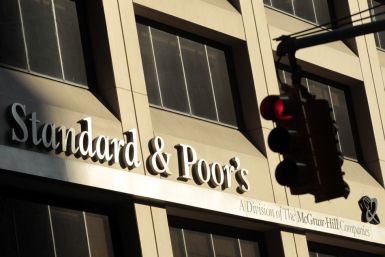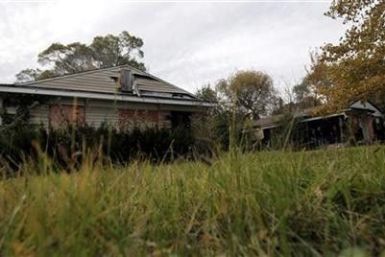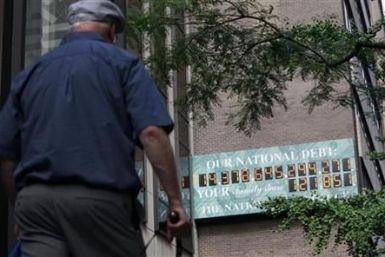Call it downgradeageddon, the fear sending U.S. markets sharply lower.
The Dow lost four percent in trading mid-day Monday, while the Nasdaq and S&P lost five percent. President Barack Obama addressed downgrade Monday, but the markets dropped further after his comments.
The stock market today show sharp drops, following a downgrade by S&P from a stellar AAA to AA+, including all sectors in the S&P 500. On the other hand, investors are rushing into buying bonds rather than stock.
The U.S. downgrade drama heated up Monday, as stock markets domestically and abroad plunged. The end of the story hasn't been told, yet. But how it ends lies in the hand of the leading character -- U.S. President Barack Obama.
Shares of major gold mining companies notched fresh gains in midday trading Monday as the price of the precious metal topped $1,700 per ounce.
The United States is unlikely to get its AAA rating back any time soon, and if Washington fails to follow through on spending cuts, the nation faces an even further downgrade, two Standard & Poor's execs said Monday.
These institutions process trades and are key to the daily operation of the U.S. financial markets.
Standard & Poor's downgrading in the U.S. continued Monday, as the ratings agency lowered Fannie Mae and Freddie Mac, which own or guarantee roughly half of all mortgages in America.
It looks like the U.S. Government isn't the only one taking a ratings hit. Standard & Poor's cut Freddie Mac's and Fannie Mae's long-term ratings one notch on Monday.
On Friday, S&P reduced the U.S. credit rating by one notch from the highest rating of AAA to AA+, with a negative outlook.
China bluntly criticized the United States on Saturday one day after the superpower's credit rating was downgraded, saying the "good old days" of borrowing were over.
MERS, the electronic mortgage registry that faces multiple investigations for its role in thousands of problematic foreclosure cases, changed its rules to lower its profile in court-supervised foreclosures.
'History shows that even when the decision to raise the debt ceiling goes down to the wire, it does not lead to a default or a change in the perception that the US is the gold standard against which to benchmark other debt. This time around the stakes are higher.'
Call it 'dueling debt plans': Sen. Harry Reid, D-Nev. announced Monday a $2.7 trillion spending reduction plan, while House Speaker John Boehner, R-Ohio, announced a 2-stage spending cut plan, $1 trillion now, and $1.2 trillion next year. If the two sides can get down to negotiating, Monday will be a day of progress in the debt deal saga.
Moody's says the U.S. should eliminate its legislative debt ceiling limit altogether. Moody's says the limit does no good, since lawmakers can still approve expenditures anyway. Moody's says the debt ceiling limit only serves to create angst among bondholders as the limit is approached but not raised on a timely basis.
Credit-rating service Moody's said that it is putting the U.S. government on review. Our government may see a downgrade from its Aaa bond rating because of the increasing possibility that the debt ceiling will not be raised in time to prevent a missed payment of interest or principal on outstanding bonds and notes.
Moody's has put the U.S. government's bond rating on watch for possible downgrade.
Bank of America (NYSE:BAC), one of the nation's largest banks by assets, has confirmed an $8.5 billion settlement with high-profile investors over mortgage loans, and would report a second-quarter loss in the range of $8.6 billion to $9.1 billion.
Bank of America (NYSE:BAC) is nearing an $8.5 billion settlement with high-profile investors over mortgage loans, according to people familiar with the matter.
Over the past several decades, some very alarming long-term economic trends have developed that are absolutely destroying the economy. Here are 50 hard facts and statistics that show the negative trends in several areas of the economy. If dramatic changes are not made soon, a complete and total economic collapse becomes a possibility
Congress should pass legislation overhauling the U.S. housing finance system within two years, though it should not act in haste, Treasury Secretary Timothy Geithner said.
Homeownership as an investment is no longer the rock-solid foundation for the American Dream it once was, according to a survey released on Monday by the firm the government created in the 1930s to promote homeownership.































